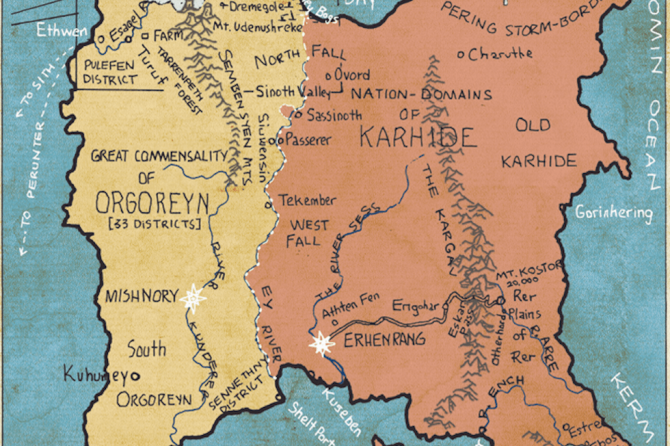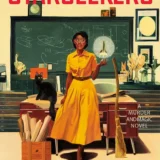This blog post has been in the formative stage for a few years, since I first began to learn the nuances of the genre vs. literary divide. Like a child stumbling into an unfamiliar situation, I had questions: Why don’t they like us? What’s the big difference? Can’t we all just get along?
For those unfamiliar with the debate, those in the industry would argue that literary fiction seeks to explore the human condition with a focus on character, while genre fiction seeks to appeal to a mass audience interested in escapism with a focus on plot. I won’t rehash all that’s been written on the subject, but you can read a pro-literary stance here: https://www.newyorker.com – Its Genre Fiction Not That Theres Aything Wrong With It and a pro-genre stance here: https://entertainment.time.com -Genre Fiction Is Disruptive Technology.
I have read several articles and engaged in a few discussions on the matter, but I am going to approach it from a different angle: the science fiction/fantasy (SFF) experience. Many fans have been reading or watching SFF since they were children (one of my earliest memories was watching Star Trek when I was three). They’ve experienced SFF across many different venues, countries, and languages—TV, movies, role-playing games (RPG), conventions, forums, volunteerism (Starship groups), jobs (especially Information Technology), Klingonese, Elvish, the list goes on.
SFF fans are some of the friendliest and smartest people I know. I’ve posted obscure questions on a Trek forum and received multiple answers within hours. I’ve read posts by people who have lost a family member to cancer or who are dealing with abuse, and the depth of sentiment and ability to relate reflected in the replies outstrips any literary story I’ve read. And they’ll also cut through any bullshit people try to post faster than a jaded gumshoe in a noir detective story.
If I see someone wearing a Red Dwarf t-shirt, boom, instant rapport. And when I see a “My Other Car is a TARDIS” bumper sticker, I smile…still. I had a conversation at work today with a woman who wrote and starred in a short film that won an award at a recent film festival. She mentioned she worked with a man who wrote for White Wolf. I told her I used to play White Wolf, and then discovered we were both Ventrue. Anyone outside the genre would have no clue what we were talking about, but if they were interested, we’d welcome them with open arms.
SFF fans will plan their costumes a year in advance for a convention. They’ll argue until the wee hours of the morning about what constitutes Trek canon or whether Han shot first. They’ll stay up until 3 a.m. to finish writing an RPG joint post with you. They’ll give you solid advice on how to get rid of corrupted registration files from a bad update. They’ll decide to become scientists after watching Star Trek and end up working for NASA. They’ll DO.
I don’t know how literary writers and fans interact across various platforms, but I don’t think the way they interact truly reflects the “depth” of the human condition they seek to portray. And to me, that’s the real difference.










1984 and Brave New World can’t be both a literary and a science fiction novel? I think most people would classify them as literary classics, without consideration of genre, which is only a phony French word that doesn’t really mean anything. Why this insistence on categorizing and labeling? Why label yourself as one or the other? You really don’t want to sit with the cool kids in the cafeteria? Or are you too inhibited, too unsure of your own self worth? You want to be ghettoized as a writer in a limited genre? Makes no sense to me. This is the way people thought in the past. The lines between genres and between genre and literary are blurring. They’re melting away. Why shouldn’t science fiction have some literary merit? Why shouldn’t a sf writer delve deep into character and theme? Write what you want to write without looking to see if your coloring outside the lines. Otherwise the requirements of genre become a straight jacket.
Ultimately, there are only two classifications: Writing I Like and Writing I Don’t Like. These categories can be applied to everyone and would cross over many genres and include various writers. However, the book industry can’t parse the book-buying public and push out targeted books/messages according to these classifications, because Writing I Like would be different from person to person. So, I partly blame marketing models for the proliferation of labels.
That said, when I first decided to become a writer and was researching various creative writing programs (and having no knowledge about genre vs. literary), upon telling the recruiter that I wanted to write science fiction, I was invariably met with flinty replies such as, “We don’t teach genre writing,” or “Science fiction is not an available track,” and the like. So I wasn’t the one pushing labels on writers. Therefore, I had to search for “science fiction genre writing programs,” of which I found a few, and settled on Seton Hill University. I wouldn’t have traded the experience for the world. You see, to me, the cool kids in the cafeteria are the genre writers. And I view “literary” as general, limited to this reality. I see limitless possibilities in SF. It has already delved deep into character and theme, and it still is. SF writers have been “coloring outside the lines” for years, because they keep pushing the boundaries of genre. And I think because of this, the lines between genre and literary are blurring. But I don’t care if SF has “literary” merit because I know it has its own merit without self-appointed “literary” magistrates deigning to fawn over a chosen few SF titles because they address the requisite themes of “literary” writing.
K,
I agree totally that labeling and categorization are the tools of the marketplace. It’s easier to keep track of the inventory that way. But I think to pigeonhole a writer into one kind of genre is to do him or her a disservice. What happens when you write in genre X and have a reputation in that area, and you try to write something out of that category in genre Y the general reaction from editors and publishers is: “You’re a X-genre writer, so why don’t you stick with that?” You get locked into that genre whether you like it or not. Even harder to break out of genre writing into mainstream. It’s demeaning to a writer to put a stamp on him that dictates what kind of story he should write. And I don’t think writers should assist the marketplace by helping to enforce that trend. In an ideal world I’d be in favor of no labels. No genres. Just call it literature. I seriously doubt George Orwell ever thought of himself as an sf writer.
But labelization happens across the arts. Jazz great Yusef Lateef hates the term “jazz” applied to his music. He says the definition of Jazz is something vulgar. He prefers to call it AutoPhysioPsychic Music– music that comes from the mind heart and spirit. How do you categorize that? Another thing about genrefication is it fosters a “me against them attitude,” which doesn’t serve much purpose other than to segregate and divide. Anyway, you and I agree that sf is pushing the boundaries beyond genre and that’s a good thing. Donald Maas addresses this issue in his new book, Writing 21st Century Fiction. He seems to believe that modern fiction is blurring the lines between the old genre distinctions.
Fortunately, the old models of publishing are crumbling, and the gatekeepers have to compete with self-publishers and small presses. Authors can also publish under pseudonyms, as J.K. Rowling did. So perhaps the lines will blur even further, as to one day be indistinguishable. We can only hope.
“You’re a X-genre writer, so why don’t you stick with that?”
Iain (M.) Banks. Mary Stewart, M.K. Wren. Dan Simmons. Ray Bradbury.
As someone who’s been on both sides of this group (I was on track to go for an MFA in creative writing until I decided I didn’t enjoy writing literary fiction), the experience you’ve described is how us literary fiction aficionados interact, too. We stayed up late working on manuscripts, and talking about the short stories of Raymond Carver, and went to museums and on road trips and stuff. What you’ve described is pretty much the human experience, just with a lot of science fiction and fantasy modifiers.
As for the divide, I am all aboard the Lev Grossman train. And I don’t think the divide is as strong as people say. The problem, for years, was that literary fiction fans were only aware of popular sci-fi and fantasy, which, to be fair, was Star Trek novels and Lord of the Rings imitators. Most of that is pretty uneven and predictable.
Now, thanks to the internet, literary fans (and sf/f fans!) are able to find works in the “other” field that actually work for them. It’s how I got here! I read China Mieville and Philip K. Dick and all those people who do sf/f real well. I’m sure there are plenty of sf/f fans, too, who picked up somebody like George Saunders or Steven Millhauser or Cormac McCarthy and realized, wait, these guys are doing genre.
Sure, the old guard on both sides definitely distrust one another, and there will always be a little bit of a divide (as there’s still room for the explosion heavy space opera, and the literary story about an expat in Paris), but it’s shrunk dramatically.
There are more literary writers using popular fiction tropes, but the problem, to me, is that they won’t admit they’re writing genre. New Wave SF writers in the 60s experimented with form, character, and taboo subjects, introduced postmodernism to the “SF ghetto,” yet SF is still described as “talking squids in outer space.” If literary writers are going to settle from on high into the genre moshpit, they can at least own it.
Wow, well said.
Sadly, a lot of new writers are being coerced by into believing there is such a great divide because “the content of the work is very different” in the eyes of publishers – https://www.huffingtonpost.com/2013/08/21/literary-novels-_n_3790198.html.
It’s like forcing me to pick the cool table to sit at in the lunchroom. Now that I think about it, I don’t want to sit at THAT table anyway. But there’s always an open chair at THIS one…and everybody is welcome to join us.
Thanks. 🙂 It’s all subjective. How would you classify 1984 and Brave New World?
HAHA! Now I’m imagining Revenge of the Nerds as a genre vs. literary metaphor.
1984 and Brave New World are Science Fiction.
Thank you!
You’re welcome! I don’t think it’s even arguable. 1984 and Brave New World could serve as textbook definitions of SF, being novels conforming to a realistic vision of the way the universe works and extrapolating realistic technological advances which did not at the time of writing. That’s simply what ‘real’ hard SF is. Anyone arguing with that simply doesn’t understand or accept the definition.
Rick, I read that piece. It defines ‘mainstream’ fiction as containing some literary techniques, but more action/plot driven. It describes ‘literary’ fiction as being concerned with the authors concerns, more character driven, more prose. It doesn’t mention ‘genre’ fiction. Which is I suppose too far down the pile to bother with.
But this occurred to me: the only thing that literary fiction seems to have for itself – so etching not also engaged in by other supposed schools, is cutesy word play. writing for the sound and rythm as opposed to having any central point. Doesn’t the fact that this is the only thing that distinguished ‘literary,’ writing suggest that it is that form which ought to be relegated to niche marketing?
Good point Steve. It’s that shameful hypocrisy in literature!
They say literary fiction is “driven by the ideas, themes, and concerns of the novelist, often producing a narrative that is at times controversial.” It’s a good thing that never happens in genre fiction (*giggle*snort*).